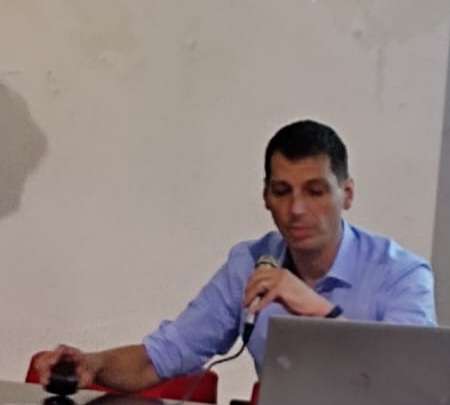Studying at the University of Verona
Here you can find information on the organisational aspects of the Programme, lecture timetables, learning activities and useful contact details for your time at the University, from enrolment to graduation.
Academic calendar
The academic calendar shows the deadlines and scheduled events that are relevant to students, teaching and technical-administrative staff of the University. Public holidays and University closures are also indicated. The academic year normally begins on 1 October each year and ends on 30 September of the following year.
Course calendar
The Academic Calendar sets out the degree programme lecture and exam timetables, as well as the relevant university closure dates..
| Period | From | To |
|---|---|---|
| First half of Semester 1 | Sep 25, 2017 | Nov 11, 2017 |
| Second half of Semester 1 | Nov 13, 2017 | Jan 20, 2018 |
| First half of Semester 2 | Feb 26, 2018 | Apr 21, 2018 |
| Second half of Semester 2 | Apr 23, 2018 | Jun 9, 2018 |
| Session | From | To |
|---|---|---|
| Sessione d'esame invernale | Jan 22, 2018 | Feb 24, 2018 |
| Sessione d'esame estiva | Jun 11, 2018 | Jul 28, 2018 |
| Sessione d'esame autunnale | Aug 27, 2018 | Sep 22, 2018 |
| Period | From | To |
|---|---|---|
| All Saints Day | Nov 1, 2017 | Nov 1, 2017 |
| Immaculate Conception | Dec 8, 2017 | Dec 8, 2017 |
| Christmas break | Dec 22, 2017 | Jan 7, 2018 |
| Easter break | Mar 30, 2018 | Apr 3, 2018 |
| Liberation Day | Apr 25, 2018 | Apr 25, 2018 |
| Labour Day | May 1, 2018 | May 1, 2018 |
| Patron Saint Day | May 21, 2018 | May 21, 2018 |
| Republic Day | Jun 2, 2018 | Jun 2, 2018 |
| Summer break | Aug 13, 2018 | Aug 18, 2018 |
Exam calendar
Exam dates and rounds are managed by the relevant Culture and Civilisation Teaching and Student Services Unit.
To view all the exam sessions available, please use the Exam dashboard on ESSE3.
If you forgot your login details or have problems logging in, please contact the relevant IT HelpDesk, or check the login details recovery web page.
Should you have any doubts or questions, please check the Enrollment FAQs
Academic staff

Mastrocinque Attilio
 attilio.mastrocinque@univr.it
attilio.mastrocinque@univr.it
 +39 045802 8386
+39 045802 8386
Study Plan
The Study Plan includes all modules, teaching and learning activities that each student will need to undertake during their time at the University.
Please select your Study Plan based on your enrollment year.
1° Year
| Modules | Credits | TAF | SSD |
|---|
2° Year activated in the A.Y. 2018/2019
| Modules | Credits | TAF | SSD |
|---|
| Modules | Credits | TAF | SSD |
|---|
| Modules | Credits | TAF | SSD |
|---|
Legend | Type of training activity (TTA)
TAF (Type of Educational Activity) All courses and activities are classified into different types of educational activities, indicated by a letter.
History of the Classical World (2017/2018)
Teaching code
4S003276
Teacher
Coordinator
Credits
6
Language
Italian
Scientific Disciplinary Sector (SSD)
L-ANT/03 - ROMAN HISTORY
Period
First half of Semester 2 , Second half of Semester 2
Learning outcomes
A comparison between the Roman and the Etruscan culture will be proposed in the centuries of interaction and, later on, in those of war. Data proving reciprocal cultural influences in the 6th and 5th centuries will be discussed in a critical manner, and a particular focus will be deserved to the Tarquinian period.
The period of wars between Romans and Etruscans will be not dealt with by means of a basic approach to Livy, but by proposing a series of insights particularly interesting in the case of archaeological documents which contribute to the historical reconstruction.
The phase between the Social War and the Augustan Age will be another special focus because in this period the Etruscans became Roman citizens and the law of their estates and their slaves became the Roman law.
Students will be able to evaluate autonomously some testimonies to Roman history by means of comparisons between different authors or between authors and different kinds of documentation, in order to evaluate the reliability of each document.
Students are expected to improve their communication skill by expressing their opinions or even their doubts concerning the dealt topics and by receiving answers and directions about how to organize their speech.
Also the understanding skill should be improved by means of a critical reading of historical texts and the study of images of monuments and other iconographies.
At the end of the teaching activities a student should be able to show that he has understood the most important problems discussed in the classes, that he is able to analyse in a critical manner both the sources and the iconographies taken into account. A student should explain this following a logical series of points, clearly and on the basis of the fundamental documents.
Program
The Etruscans and Rome
1) First: classes devoted to selected topics;
2) Second: Dionysius of Halicarnassus, Roman Antiquities (ed. by F. Donadi and Elisabetta Guzzo, Torino, Einaudi, 2005, or another edition with commentary). Knowledge of the original, Greek text is not mandatory.
3) Third: knowledge of passages from classical authors and monuments which will be read and commented during the course;
4) The use of a historical atlas is recommended.
Further readings (their reading is not mandatory):
M.Torelli, Storia degli Etruschi, Bari, Laterza 1990; M.Sordi, I rapporti romano-ceriti e l'origine della civitas sine suffragio, Rome, L'Erma di Bretschneider 1960; W.V. Harris, Rome in Etruria and Umbria, Oxford 1971
Didactic method.
The course is divided into two parts:
- the first consists in the classes, devoted to the above mentioned topics. Students will be provided with images and texts thanks to powerpoint files with images of archaeological documents and historical texts, which will be at their disposal also online.
- the second part consists in the personal study of the above mentioned works.
At the end of each lesson a short debate is possible in order to clarify what could have been eventually difficult to understand.
Students who are unable to attend every class may use the E-Learning site of the University of Verona, where they may find the recorded lessons, the images and texts which are necessary for their study.
| Author | Title | Publishing house | Year | ISBN | Notes |
|---|---|---|---|---|---|
| Sordi, Marta | I rapporti romano-ceriti e l'origine della civitas sine suffragio | L'Erma di Bretschneider | 1960 | La lettura è facoltativa | |
| Dionigi di Alicarnasso | Le antichità romane | Einaudi | 2005 | Lo studio di quest'opera è obbligatorio. Possono essere usate anche altre edizioni di Dionigi. | |
| Harris, William V. | Rome in Etruria and Umbria | Clarendon Press | 1971 | La lettura è facoltativa | |
| Torelli, Mario | Storia degli Etruschi, | Laterza | 1990 | La lettura è facoltativa |
Examination Methods
oral exam. Questions will be posed in order to ascertain what learning and knowing level is reached. Eventually, the questions could go further in deep by focussing on texts and/or monuments discussed during the course.
Type D and Type F activities
Modules not yet included
Career prospects
Module/Programme news
News for students
There you will find information, resources and services useful during your time at the University (Student’s exam record, your study plan on ESSE3, Distance Learning courses, university email account, office forms, administrative procedures, etc.). You can log into MyUnivr with your GIA login details: only in this way will you be able to receive notification of all the notices from your teachers and your secretariat via email and soon also via the Univr app.
Graduation
Linguistic training CLA
Doppio Titolo
Il doppio titolo è un programma integrato di studio attivato a seguito di una convenzione fra l’Ateneo di Ferrara e una Università straniera.Nell'ambito del corso di laurea magistrale in Quaternario, preistoria e archeologia è attivo un progetto di doppio titolo erogato in partnership con il Master “Mention Archéologie, sciences pour l’archéologie parcours Arts, Sociétés, Environnements de la Préhistoire et de la Protohistoire: Europe, Afrique” dell’Université de Toulouse Jean Jaurès (Francia)
Gli interessati potranno candidarsi al progetto come previsto dal bando di selezione.
Per ulteriori informazioni si rimanda al bando di ammissione del doppio titolo:
http://www.unife.it/interfacolta/lm.preistoria/doppio-titolo



